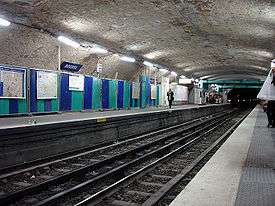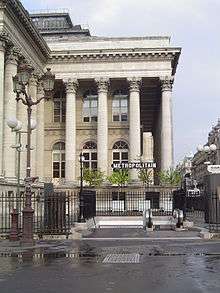Bourse (Paris Métro)
Bourse (pronounced [buʁs]) is a station on Paris Métro Line 3, located in the 2nd arrondissement of Paris.
| Paris Métro station | |||||||||||
 | |||||||||||
| Location | 12, place de la Bourse Rue Notre-Dame-des-Victoires at rue Réaumur 2nd arrondissement of Paris Île-de-France France | ||||||||||
| Coordinates | 48°52′07″N 2°20′29″E | ||||||||||
| Owned by | RATP | ||||||||||
| Operated by | RATP | ||||||||||
| Other information | |||||||||||
| Fare zone | 1 | ||||||||||
| History | |||||||||||
| Opened | 19 October 1904 | ||||||||||
| Services | |||||||||||
| |||||||||||
| Location | |||||||||||
 Bourse Location within Paris | |||||||||||
Location
The station is located under the axis of the Rue Quatre-Septembre and Réaumur, right next to Place de la Bourse. Oriented approximately along an east–west axis, it is located between Quatre-Septembre and Sentier stations.
History

It opened on 19 October 1904 as part of the first section of the line opened between Père Lachaise and Villiers. It is named after the nearby Bourse de Paris (stock exchange) of which it provides a service, and at the center of which is built the Palais Brongniart, then known as the Palais de la Bourse because it housed the Paris Stock Exchange at the time. The latter sat there from 1828 to 1998 before being integrated into Euronext.
As part of the RATP's Metro Renewal program, the station's corridors were renovated on 11 July 2003, then the turn of the platforms in 2008.[1]
In 2019, 3,386,481 travelers entered this station which places it at 148th position of metro stations for its usage.[2]
On 9 October 2019, half of the nameplates on the platforms were temporarily replaced by the RATP in order to celebrate the 60th anniversary of Astérix and Obélix, as in eleven other stations.[3] Taking up in particular the typography characteristic of the comics of René Goscinny and Albert Uderzo, the Bourse was humorously renamed Sesterce, from the name of the Roman currency in use during the last two centuries of the Roman Republic.
Passenger services
Access
The station has two adjoining accesses to the Palais Brongniart, whose respective surroundings have the distinction of being integrated into the gates surrounding the latter:
- entrance 1 - Palais Brongniart, consisting of a fixed staircase lined with an escalator, with an atypical inscription (METROPOLITAIN) above the gates, at the southwest corner of the building;
- entrance 2 - Rue Notre-Dame-des-Victoires, with a fixed staircase established on the same street, at the southeast corner of the building.
Station layout
| Street Level |
| B1 | Mezzanine |
| Line 3 platforms | Side platform, doors will open on the right | |
| Westbound | ← | |
| Eastbound | | |
| Side platform, doors will open on the right | ||
Platforms
Bourse is a standard configuration station. It has two platforms separated by the metro tracks and the vault is elliptical. The decoration is that of the style used for most metro stations. The lighting canopies are white and rounded in the Gaudin style du renouveau du métro des années 2000 renovation, and the bevelled white ceramic tiles cover the walls, the vault, the tympans and the outlets of the corridors. The advertising frames are in white ceramic and the name of the station is written in Parisine font on enameled plates. The seats are in the Akiko style in cyan color.
Bus services
The station is served by lines 20, 29, 39, 74 and 85 of the RATP Bus Network and, at night, by lines N15 and N16 of the Noctilien network.
Nearby Attractions
- Paris Bourse
- Palais Brongniart
- Town Hall of the 2nd arrondissement
- National Library of France (Rue de Richelieu branch)
- Agence France-Presse
| Wikimedia Commons has media related to Bourse (Paris Metro). |
References
- "SYMBIOZ - Le Renouveau du Métro". www.symbioz.net (in French). Retrieved 2 April 2020.
- "Trafic annuel entrant par station du réseau ferré 2019". data.ratp.fr (in French). Retrieved 2 April 2020.
- "VIDÉOS. Pour les 60 ans d'Astérix, des stations du métro de Paris renommées et décorées". actu.fr (in French). Retrieved 2 April 2020.
- Roland, Gérard (2003). Stations de métro. D’Abbesses à Wagram. Éditions Bonneton.